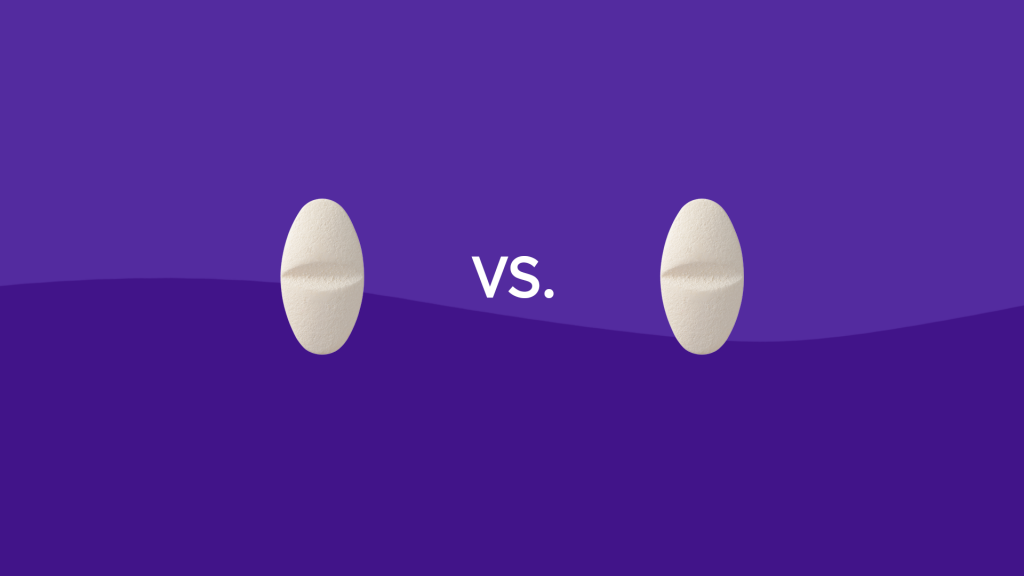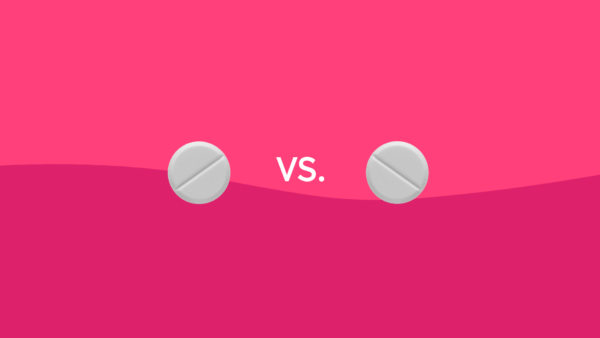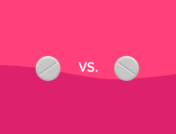Drug overview & main differences | Conditions treated | Efficacy | Insurance coverage and cost comparison | Side effects | Drug interactions | Warnings | FAQ
Viibryd (vilazodone) and Lexapro (escitalopram) are brand-name prescription drugs used to treat major depressive disorder (MDD). Both drugs can help treat symptoms of depression, which may include prolonged feelings of sadness, loss of energy, and sleep changes. Viibryd or Lexapro may be prescribed after a medical evaluation by a healthcare provider who specializes in psychiatry.
Both Viibryd and Lexapro are antidepressants that primarily work to increase the activity of serotonin in the brain. Serotonin is a chemical neurotransmitter that is believed to play an important role in mood and feelings of well-being. Viibryd and Lexapro work as serotonin reuptake inhibitors (SSRIs), which help to increase overall serotonin levels in the brain.
Although both drugs can be used to treat depression, they do have some differences in how they’re used and how they work.
What are the main differences between Viibryd and Lexapro?
Viibryd
Viibryd is the brand name for vilazodone. It was originally approved by the Food and Drug Administration (FDA) in 2011 to treat major depressive disorder. There is currently no generic version available on the market. In addition to being classified as an SSRI, Viibryd is also a partial 5-HT1A receptor agonist.
Viibryd comes as a 10 mg, 20 mg, and 40 mg oral tablet that is taken once daily with food. Viibryd may not work as well if it is not taken with food. It reaches maximum levels in the blood after five hours and has a half life of approximately 25 hours.
Lexapro
Lexapro is the brand name for escitalopram. It was FDA approved in 2002 to treat MDD in both adults and adolescents aged 12 to 17 years old. In addition to depression, Lexapro can treat generalized anxiety disorder. Generic versions of Lexapro are also available on the market.
Lexapro can be taken as an oral tablet in strengths of 5 mg, 10 mg, or 20 mg. It is usually taken once daily with or without food. Lexapro reaches peak blood levels within five hours and has a half life of up to 32 hours.
| Main differences between Viibryd and Lexapro | ||
|---|---|---|
| Viibryd | Lexapro | |
| Drug class | Selective Serotonin Reuptake Inhibitor (SSRI) Partial 5-HT1A agonist |
Selective Serotonin Reuptake Inhibitor (SSRI) |
| Brand/generic status | No generic version available | Brand and generic version available |
| What is the generic name? | Vilazodone | Escitalopram |
| What form(s) does the drug come in? | Oral tablet | Oral tablet |
| What is the standard dosage? | 20 mg once daily | 20 mg once daily |
| How long is the typical treatment? | Long-term | Long-term |
| Who typically uses the medication? | Adults | Adults and adolescents |
Conditions treated by Viibryd and Lexapro
Viibryd and Lexapro are FDA-approved antidepressants that are used to treat major depressive disorder. Either drug may be prescribed in combination with psychotherapy and lifestyle changes to help alleviate symptoms of depression.
Lexapro is also FDA approved to treat generalized anxiety disorder (GAD). Although it’s not approved for anxiety, Viibryd has been studied in clinical trials for the treatment of anxiety. Viibryd or Lexapro may sometimes be used off-label to treat obsessive-compulsive disorder (OCD).
| Condition | Viibryd | Lexapro |
| Major depressive disorder | Yes | Yes |
| Generalized anxiety disorder | Off-label | Yes |
| Obsessive-compulsive disorder | Off-label | Off-label |
Is Viibryd or Lexapro more effective?
In one randomized, clinical trial, vilazodone and escitalopram were compared head-to-head among a sample of 50 patients. Hamilton Anxiety Scale (HAM–A) and Hamilton Depression Rating Scale (HAM-D) scores were lowered in both treatment groups. However, escitalopram was found to lower overall HAM-A and HAM-D scores more than vilazodone (P<0.0001).
In a systematic review, escitalopram was compared to six other antidepressants, including fluoxetine, citalopram, and sertraline. This study reviewed multiple meta-analyses and found that escitalopram was more effective and alleviated depression symptoms quicker than other SSRIs.
Compared to placebo, or no treatment, Viibryd and Lexapro are effective options for treating depression. However, differences in how a person responds may play an important role in how effective an antidepressant can be. Therefore, it’s important to consult a healthcare provider for medical advice when starting or switching to a new antidepressant.
Coverage and cost comparison of Viibryd vs. Lexapro
Viibryd is only available as a brand-name medication. For this reason, it may be a more expensive option compared to other antidepressants. Some Medicare and insurance plans may cover Viibryd. The average cash price of Viibryd is around $389. Using a SingleCare Viibryd coupon may lower the cost to $278 at participating pharmacies.
Lexapro is available as a brand-name and generic medication. Compared to Viibryd, it’s a cheaper option. It’s also covered by most Medicare and insurance plans. The average cash price of generic Lexapro is around $177. With a discount coupon from SingleCare, you can get the generic for around $15.
| Viibryd | Lexapro | |
| Typically covered by insurance? | Yes | Yes |
| Typically covered by Medicare Part D? | Yes | Yes |
| Quantity | 20 mg once daily (quantity of 30 tablets) | 20 mg once daily (quantity of 30 tablets) |
| Typical Medicare copay | $1–$11 | $0–$30 |
| SingleCare cost | $278+ | $15+ |
Common side effects of Viibryd vs. Lexapro
The most common side effects of Viibryd are diarrhea, nausea, dry mouth, headache, and increased sweating. Other possible side effects include dizziness, drowsiness, insomnia, and joint pain (arthralgia), among others.
The most common side effects of Lexapro are nausea, headache, diarrhea, increased sweating, and dry mouth. Other possible side effects of Lexapro may include constipation and flu-like symptoms.
Viibryd and Lexapro, like other antidepressants, may cause changes in appetite. This could lead to weight gain or weight loss in some people.
Both Viibryd and Lexapro can also cause sexual side effects. The use of either antidepressant may cause a decreased sex drive (libido). Viibryd and Lexapro can also cause sexual dysfunction, such as erectile dysfunction, and problems with ejaculation. Because Viibryd also acts as a partial 5-HT1A receptor agonist, it may have a lower risk of sexual side effects than Lexapro.
| Viibryd | Lexapro | |||
| Side effect | Applicable? | Frequency | Applicable? | Frequency |
| Diarrhea | Yes | 26% | Yes | 8% |
| Constipation | No | – | Yes | 3% |
| Increased sweating | Yes | * | Yes | 5% |
| Nausea | Yes | 22% | Yes | 15% |
| Dry mouth | Yes | 8% | Yes | 6% |
| Indigestion | Yes | 2% | Yes | 3% |
| Flu-like symptoms | No | – | Yes | 5% |
| Headache | Yes | 15% | Yes | 24% |
| Dizziness | Yes | 6% | Yes | 5% |
| Drowsiness | Yes | 4% | Yes | 6% |
| Insomnia | Yes | 7% | Yes | 9% |
| Palpitations | Yes | 1% | Yes | * |
| Increased appetite | Yes | 1% | Yes | * |
| Weight gain | Yes | 1% | Yes | * |
| Decreased appetite | Yes | * | Yes | 3% |
| Joint pain | Yes | 2% | Yes | * |
| Erectile dysfunction | Yes | 3% | Yes | 3% |
| Ejaculation disorder | Yes | 1% | Yes | 9% |
| Decreased libido | Yes | 4% | Yes | 3% |
*not reported
Frequency is not based on data from a head-to-head trial. This may not be a complete list of adverse effects that can occur. Please refer to your doctor or healthcare provider to learn more.
Source: DailyMed (Viibryd), DailyMed (Lexapro)
Drug interactions of Viibryd vs. Lexapro
Viibryd and Lexapro should be avoided while taking monoamine oxidase inhibitors (MAOIs), such as selegiline and phenelzine. Viibryd or Lexapro should not be taken within 14 days of discontinuing an MAOI or there may be an increased risk of serotonin syndrome. Viibryd and Lexapro should also be avoided or monitored with other serotonergic drugs like antidepressants, which can increase the risk of serotonin syndrome.
The use of Viibryd or Lexapro should be monitored while taking a nonsteroidal anti-inflammatory drug (NSAID) or anticoagulant. Taking these drugs together may increase the risk of bleeding.
Because Viibryd and Lexapro are primarily metabolized in the liver, their absorption may be affected by drugs that alter certain liver enzymes. Some antifungals and antibiotics can increase the levels of Viibryd and Lexapro in the blood, which can increase the risk of adverse effects. Other drugs like certain anticonvulsants can decrease blood levels of Viibryd and Lexapro, which can decrease their overall effectiveness.
Lexapro is known to potentially cause a heart rhythm disturbance called QT prolongation. Taking Lexapro with certain antipsychotic drugs like aripiprazole or quetiapine may increase the risk of QT prolongation.
| Drug | Drug class | Viibryd | Lexapro |
| Selegilin Phenelzine Rasagiline |
Monoamine oxidase inhibitors (MAOIs) | Yes | Yes |
| Paroxetine Sertraline Fluoxetine |
Selective serotonin reuptake inhibitors (SSRIs) | Yes | Yes |
| Venlafaxine Desvenlafaxine Duloxetine |
Serotonin norepinephrine reuptake inhibitors (SNRIs) | Yes | Yes |
| Amitriptyline Clomipramine Nortriptyline |
Tricyclic antidepressants (TCAs) | Yes | Yes |
| Bupropion | Aminoketone | Yes | Yes |
| Buspirone | Anxiolytic | Yes | Yes |
| Aspirin Ibuprofen Naproxen Diclofenac |
Nonsteroidal anti-inflammatory drugs (NSAIDs) | Yes | Yes |
| Warfarin | Anticoagulants | Yes | Yes |
| Digoxin | Cardiac glycoside | Yes | Yes |
| Sumatriptan Rizatriptan Eletriptan |
Triptans | Yes | Yes |
| Ketoconazole Itraconazole |
Antifungals | Yes | Yes |
| Ritonavir | Protease inhibitors | Yes | Yes |
| Clarithromycin | Antibiotics | Yes | Yes |
| Carbamazepine Phenytoin |
Anticonvulsants | Yes | Yes |
| Aripiprazole Clozapine Quetiapine |
Antipsychotics | No | Yes |
Consult a healthcare professional for other possible drug interactions.
Warnings of Viibryd and Lexapro
Antidepressants like Viibryd or Lexapro may increase the risk of suicidal thoughts, especially in young adult patients. Those taking Viibryd or Lexapro should be monitored for worsening depression and suicidal thoughts.
Selective serotonin reuptake inhibitors (SSRIs) have the potential to cause serotonin syndrome, a potentially serious condition that occurs when there’s too much serotonin in the brain. The risk is increased when antidepressants are taken with other serotonergic drugs. Signs and symptoms of serotonin syndrome may include fast heart rate, increased blood pressure, sweating, tremors, and fever.
Some people may be screened for a history of bipolar disorder prior to starting treatment with Viibryd or Lexapro. These antidepressants have the potential to activate mania or hypomania in some individuals with bipolar disorder.
Viibryd and Lexapro should be tapered or discontinued gradually if needed. Abrupt discontinuation of antidepressants could increase the risk of withdrawal symptoms.
Consult a healthcare provider for other possible warnings and precautions.
Frequently asked questions about Viibryd vs. Lexapro
What is Viibryd?
Viibryd is a brand-name prescription drug used to treat major depressive disorder (MDD). It is the brand name for vilazodone. Viibryd works as a selective serotonin reuptake inhibitor (SSRI) and partial 5-HT1A receptor agonist. It is usually taken as a 20 mg tablet once daily with food.
What is Lexapro?
Lexapro is a brand-name medication that is FDA approved to treat major depressive disorder (MDD). It is also approved to treat generalized anxiety disorder (GAD). The generic name of Lexapro is escitalopram. Lexapro is an SSRI drug that is taken once daily.
Are Viibryd and Lexapro the same?
Viibryd and Lexapro work in similar ways to treat mental health conditions, but they are not the same. Viibryd works as an SSRI and partial 5-HT1A agonist while Lexapro works primarily as an SSRI. Although Viibryd and Lexapro are both approved to treat major depression, Lexapro is also approved to treat anxiety.
Is Viibryd or Lexapro better?
The better antidepressant is the one that you respond the best to. Viibryd and Lexapro are both effective prescription drugs for depression. Compared to Lexapro, Viibryd may cause fewer sexual side effects.
Can I use Viibryd or Lexapro while pregnant?
Antidepressants like Viibryd or Lexapro may be safe to take while pregnant. However, there is not enough clinical evidence to show that Viibryd or Lexapro are completely safe or dangerous to take during pregnancy. These drugs should only be taken if the benefits outweigh the risks. Consult a healthcare provider for medical advice on taking antidepressants while pregnant.
Can I use Viibryd or Lexapro with alcohol?
Drinking in moderation will likely not cause any harm if you’ve been on consistent treatment with Viibryd or Lexapro. However, the use of alcohol could increase the risk of adverse effects, like dizziness, drowsiness, and confusion. Consult a healthcare provider on the safety of antidepressants while drinking alcohol.
Is Viibryd good for anxiety?
The active ingredient in Viibryd, vilazodone, has been studied for the treatment of anxiety. According to clinical trials, vilazodone may be an effective treatment option for generalized anxiety disorder (GAD). More research is needed though. Currently, Viibryd is not FDA approved to treat anxiety.
What is the best time of day to take Viibryd?
Viibryd should be taken at the same time every day. Depending on your body’s response to the medication, it may be better to take Viibryd in the morning or in the evening. Most doctors recommend taking Viibryd in the morning with breakfast.
What happens if I take Viibryd without food?
Viibryd may not be as effective if taken without food. This is because Viibryd is absorbed better when administered with a meal. Compared to its absorption with food, the absorption of Viibryd without food is lower by almost 50%.





